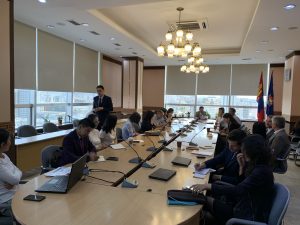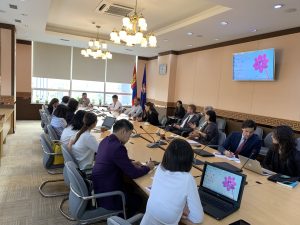 July 4, Ulaanbaatar, Mongolia – GGGI and the Ulaanbaatar City Engineering Facility Department organized a workshop on preparation for the NAMA facility mission to Ulaanbaatar, Mongolia for the on-site assessment of ‘EPC for Residential Buildings’. The on-site assessment will take in place between July 22-24, 2019.
July 4, Ulaanbaatar, Mongolia – GGGI and the Ulaanbaatar City Engineering Facility Department organized a workshop on preparation for the NAMA facility mission to Ulaanbaatar, Mongolia for the on-site assessment of ‘EPC for Residential Buildings’. The on-site assessment will take in place between July 22-24, 2019.
In order to be well prepared for the mission and able to answer NAMA’s most important questions, GGGI organized this workshop including all relevant stakeholders such as MET, MCUD, ERC, UB city, GIZ, private companies, heat distribution companies, and household owners’ associations among others. The main aims of the workshop are to ensure there is a mutual understanding from all involved parties, build a common agreement on messages to convey to NAMA during the mission, and make answers to NAMA questions easier.
During the workshop, participants discussed stakeholders’ understanding of the mission, the concepts of the project, and readiness for detailed project preparation, sustainability, and potential upscaling of the project financial mechanism.
The NAMA Facility, a joint climate protection programme for national appropriate mitigation actions (NAMAs) of the German Federal Ministry for the Environment, Nature Conservation and Nuclear Safety, the UK Department for Business, Energy and Industrial Strategy, the European Commission, and the Danish Ministry of Energy, Utilities, and Climate, has conducted its 6th Call for NAMA Support Project Outlines. In the 6th Call, the NAMA Facility received a total of 51 Outlines. These Outlines have been assessed on their general eligibility, ambition, and feasibility based on criteria. An external assessor checked by the TSU led the assessment.
The “Energy Performance Contracting for Residential Retrofitting in Ulaanbaatar City” project developed by GGGI Mongolia has been short-listed for an on-site assessment in line with the procedures foreseen in the General Information Document. The purpose of the on-site assessment is to verify the initial desk assessment and to address specific issues that have been identified during the initial assessment. The Donors of the NAMA Facility will take into account the results of the on-site assessment when selecting NAMA Support Projects for support of a Detailed Preparation Phase.
The on-site assessment is conducted in the partner country by members of the TSU. During the on-site assessment, meetings with key stakeholders including the relevant national ministries, the applicant support partner, the proposed NAMA Support Organization and other donors will be held.
Background
In September 2016, Mongolia ratified its Intended Nationally Determined Contributions (INDCs) to the Paris Agreement on Climate Change in accordance with key national mandates and sectoral policies such as the Green Development Policy (2014) and its Action Plan (2016). Mongolia’s overall commitment is to reduce 14% of greenhouse gas emissions (GHG) by 2030 compared to Business-As-Usual (BAU). One of the main drivers to achieve this goal is to improve energy efficiency in production, distribution, transmission, and usage.
The Government of Mongolia set out ambitious targets and goals to improve energy efficiency, conservation of energy and reduce energy losses. Among which, Mongolia’s Green Development Policy and INDC document set out a goal to reduce building heat loss by 20% by 2020, and 40% by 2030. Although there have been a number of legal and regulatory improvements to achieve energy efficiency potential in Mongolia, there is a gap in terms of residential buildings. In aggregate terms, this sector represents 40 percent of energy consumption, more than industry and transport sectors combined. The residential building sector thus has greater potential to reduce energy demand and ultimately to reduce CO2 emissions.
Ulaanbaatar (UB) City has the highest number of building stock in Mongolia. According to the Mayor’s Office, there are 1077 pre-fabricated buildings in UB city which have high building heat loss. The Mayor’s office has developed a sub-program to carry out thermal-technical retrofits for these buildings, starting with 362 buildings that have passed the earthquake resilience test.
UB City, ICLEI East Asia, and GGGI are actively seeking to attract financing and carrying out necessary preparations to implement the TTR projects in UB City.
